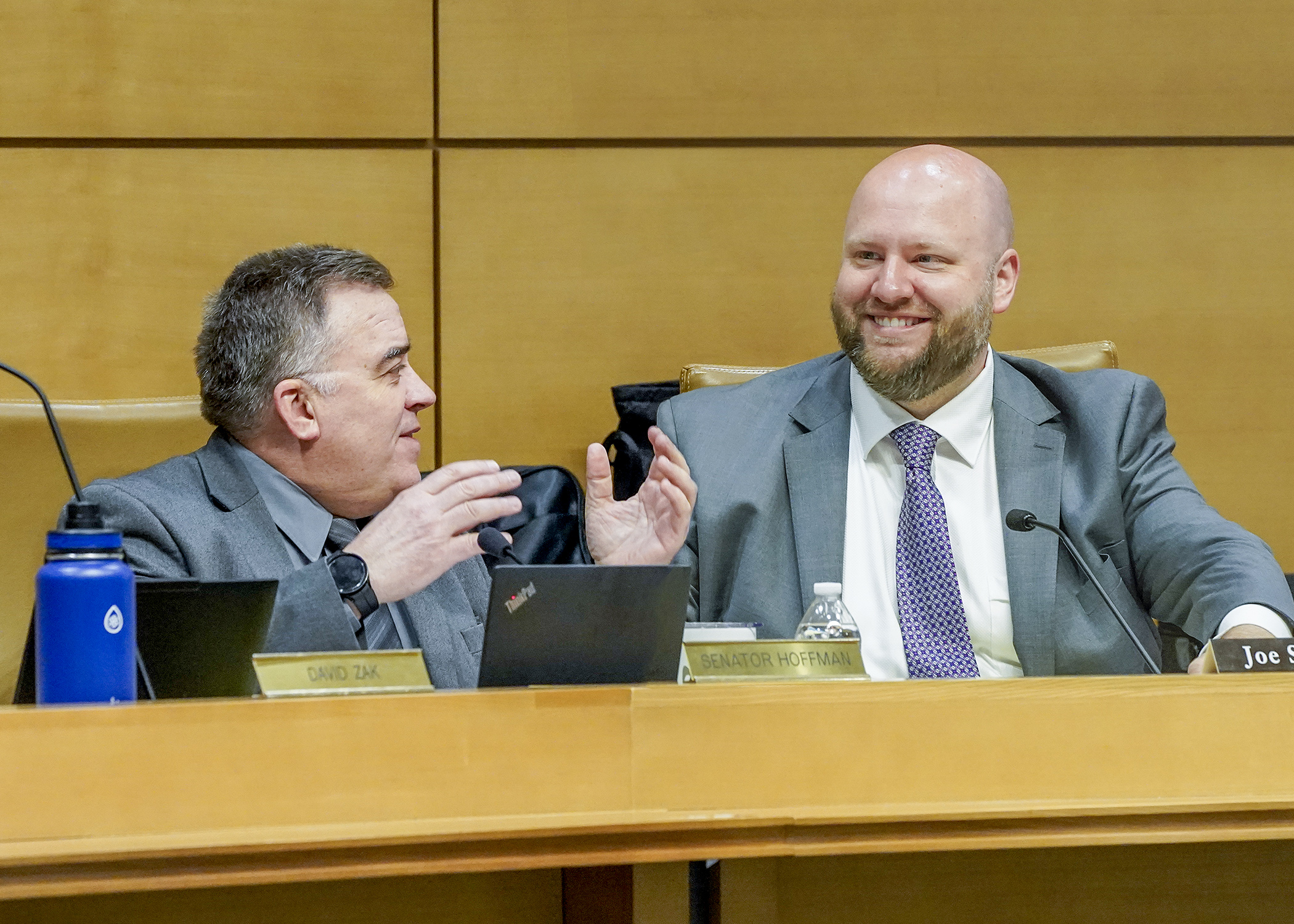Human services conference committee begins discussion on policy bill

The first meeting of a conference committee typically provides a broad overview of the differences between House and Senate budget and policy bills.
That started out as the case for the human services conference committee, but a robust discussion on the Minnesota Sex Offender Program ensued Tuesday.
After the customary walkthrough of the side-by-side of HF2115 and public testimony, Sen. Jordan Rasmusson (R-Fergus Falls) brought up a House provision that would remove the requirement for a special review board hearing, review, and recommendations when committed individuals in Minnesota Sex Offender Program petition for a reduction in custody. A judicial appeal panel would take its place.
The discussion wasn’t directly related to the provision, of which no action was taken, but rather the process of how it got there and whether the conference committee is the place to have a discussion about it.
“If this is such an important reform, I would recommend to proponents to introduce a bill in the Minnesota Senate,” said Rasmussen. “This bill, I don’t think, was ever referred to us. We never had an opportunity to have the debate. I think it’s important for us to allow stakeholders to engage and for us to have a robust discussion on the language and conference committee is not the right place to do that.”
Rep. Mohamud Noor (DFL-Mpls), co-chair of the House Human Services Finance and Policy Committee, agreed.
“I think it’s worth having the discussion, I don’t know if this is the right timing,” he said. “This is more technical, and if technical provisions become contentious, then everything else now becomes contentious.”
Rasmussen responded, “To county attorneys, this is not a technical change, it’s an important change and one that we should be thoughtful about making.”
With Monday’s session deadline getting closer, the committee will meet again on Wednesday morning.
[MORE: 'Real reforms' in human services policy bill that passes House with bipartisan support]
What’s in the bills
Some policy provisions that are the same in both bills or very close would:
- repeal the Resident Quality of Care and Outcomes Improvement Task Force;
- exempt intensive residential treatment services and residential crisis stabilization residents from certain rights in the Health Care Bill of Rights;
- prohibit county boards from charging for emergency services provided to clients experiencing emotional crisis or mental illness, and require promotion of 988 Suicide & Crisis Lifeline;
- exclude weekends and holidays from mental health diagnostic assessment 10-day timeline;
- specify that co-payments, coinsurance and deductibles do not apply to mobile crisis intervention or crisis assessment services;
- require training about a program’s drug and alcohol policy before a person has direct contact with persons served by the program; and
- add financial management services, community first services and supports, unlicensed home and community-based organizations, and consumer-directed community supports organizations for purposes of limited set-asides.
[MORE: Written testimony for and against the bill]
House-only policy would:
- establish a review process upon notice of agency denial, reduction, suspension, or termination of long-term care services and supports;
- expand services parents are allowed to provide under consumer-directed community supports to include certain personal assistance services to a minor child while temporarily out of state;
- provide residents of long-term care facilities with the right to a designated support person;
- require the Human Services Department to approve medication administration curricula for unlicensed personnel;
- allow a certified community behavioral health clinic to enroll as a provider of mental health crisis response services;
- expand the Health Care Bill of Rights to include patients in children’s residential SUD treatment, non-residential SUD treatment, intensive residential treatment services or residential crisis stabilization, and withdrawal management programs;
- require peer recovery support services to be provided one-on-one and face-to-face, including via the internet; and
- repeal Minnesota Rules governing Medical Assistance payment for clinic services.
Senate-only policy includes:
- adopting Department of Health policy proposals specifying permitted uses of restraints in assisted living facilities;
- creating nursing home and assisted living licensing exceptions for the former state hospital in Fergus Falls;
- prohibiting assisted living facilities and nursing homes from requiring a resident to have or acquire a guardian or conservator to reside in an assisted living facility;
- adding new rights under the hospice bill of rights:
- prohibiting an assisted living facility from requiring a resident or potential resident to sign a contract containing a provision for binding arbitration as a condition of admission to, or as a requirement for, continued care at a facility;
- allowing the purchase and renovation of vehicles by mobile crisis teams to provide protected transport to be eligible for adult mental health grants;
- allowing a person on probation or parole access to certain mental health, chemical health, or detoxification services; and
- allowing the attorney general or county attorney to represent the state agency or agency for prosecutions under the new human services programs’ crimes statute.
Related Articles
Search Session Daily
Advanced Search OptionsPriority Dailies
Stable budget outlook projects $3.7 billion surplus now, no deficit in next biennium
By Lisa Kaczke The projected surplus for Fiscal Years 2026-27 is now higher than it was in the November estimate, and no deficit is projected for the next biennium.
“Minnesota’s budge...
The projected surplus for Fiscal Years 2026-27 is now higher than it was in the November estimate, and no deficit is projected for the next biennium.
“Minnesota’s budge...
Legislative leaders set 2026 committee deadlines
By Lisa Kaczke Legislative leaders on Tuesday officially set the timeline for getting bills through the committee process during the upcoming 2026 session.
Here are the three deadlines for...
Legislative leaders on Tuesday officially set the timeline for getting bills through the committee process during the upcoming 2026 session.
Here are the three deadlines for...